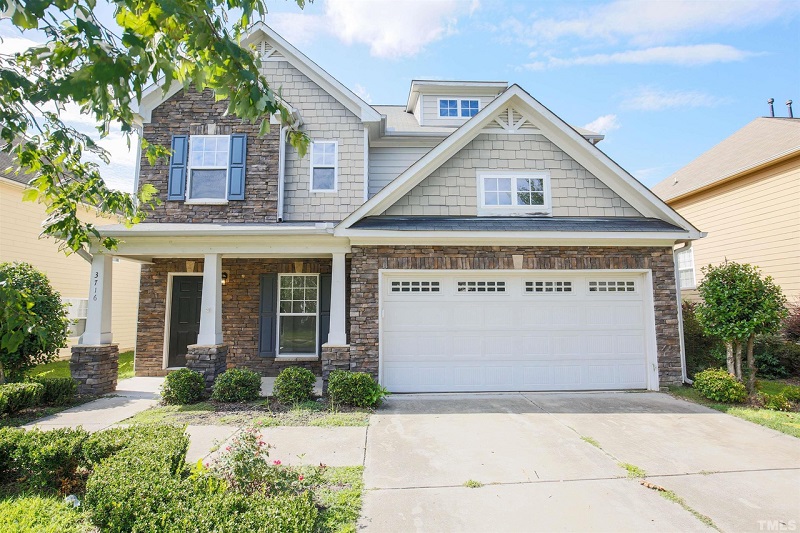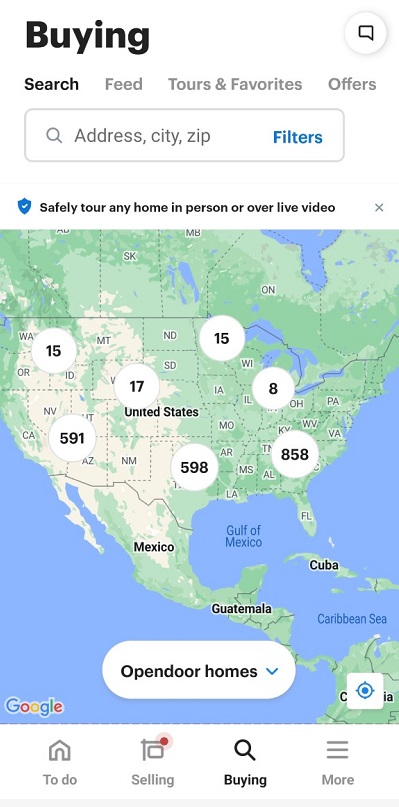Whether you follow investment news or not, there are several important reasons why homeowners and aspiring homebuyers should stay abreast of the precarious status of Opendoor (NASDAQ: OPEN), a leading publicly traded iBuyer.
Purchasing a home in any market can be fraught with risks, but this is especially true when dealing with companies that are struggling financially and are at risk of insolvency, such as Opendoor.
With still unproven business models, imperfect value propositions, and questionable standards of service, iBuyers have introduced a number of issues into today’s residential real estate market.
However, where there is risk, there is opportunity. Hence, we pose two key questions:
1. Should prospective homebuyers be purchasing homes through struggling iBuyers like Opendoor in today’s real estate market?
2. How can homebuyers take advantage of the housing inventory of debt-heavy iBuyers like Opendoor?
If you are considering working with Opendoor, or another financially challenged iBuyer, here are the risks and opportunities of which you need to be aware.
Table of Contents
- What’s an iBuyer?
- How iBuyers Can Diminish the Value of a Community
- Issues and Risks of Using an iBuyer in Today’s Real Estate Market
- How to Use an iBuyer to Your Advantage in Today’s Real Estate Market
Also see:
What’s an iBuyer?
An iBuyer, short for “Instant Buyer“, is an investor who purchases real estate from homeowners who are typically looking for a quick sale at a competitive price. The iBuyer then makes repairs on the home, refreshes the interior or exterior, and subsequently turns around and sells the property for a profit, within a short period of time.
Simply put, an iBuyer is a professional house flipper, that heavily relies on AVMs (Automated Valuation Models) that help them quickly assess and “accurately” determine the value of a given home. Although that is the accepted definition of iBuyer, the methods and results of how iBuyers are handling properties have called the definition into question.
One such iBuyer that is getting a lot of notoriety is Opendoor, as they have recently announced their Q4 results from 2022, and the results were horrendous. The bottom line is that properties were over purchased at the height of the real estate market, and the company is now stuck with billions of dollars of depreciating housing inventory which it must sell off order quickly to remain solvent.
The iBuyer model requires that companies like Opendoor maintain adequate liquidity to purchase homes, make necessary repairs, turn a property around in a relatively short time, and hopefully profit from the sale of that property.
However, what communities are often experiencing is properties being sold to iBuyers and put back on the market without meaningful repairs or renovations. The result is a languishing inventory of real estate that is priced well beyond its market value that can become a blight to a neighborhood the longer properties remain unsold and unoccupied.

An Opendoor-owned property in Wake Forest, North Carolina that has been on the market for 188 days as of March 30, 2023
How iBuyers can Diminish the Value of a Community
One of the major concerns that most potential homebuyers have with iBuyers entering their communities, is the buying power that these investors have, which effectively takes the average person out of the buying pool.
Simply put, iBuyers have the capital to outbid the average middle-class homebuyer and can offer no contingencies, an attractive benefit for sellers, and often a detriment for the average competing buyer. Multiply the buying power of the iBuyer, and you can now understand that their ability to buy multiple properties at one time, effectively reduces the inventory for the average buyer and drives up the market rate of all properties available. In essence, the average buyer can become “priced out” of the market, as they often cannot compete with iBuyers’ deep financial resources.
In addition to “no contingency” clauses in the sales contract, iBuyers can promise a quick cash sale, in return for a lower price (anywhere from 5% to 10% lower than market price), which means that these investors are paid for the convenience of the transaction.
This especially bodes well for certain types of sellers. For example, those who must quickly leave the area for a new job, have another property transaction for which they are in a contingency contract, or have jointly inherited a property due to the death of a loved one and wish to share the sale proceeds quickly with minimal inconvenience.
The decision to sell to an iBuyer, is often a sound one to an owner of a property who assumes that the abovementioned model of buy, renovate and sell is a good one for both himself and the neighborhood. However, the reality is that using an iBuyer may cause further harm to the community, if the property does not sell quickly, and instead becomes a blight to the neighborhood due to neglect and non-occupancy, which can invite squatters and crime.

The lackluster backyard of an Opendoor-owned property in Maricopa, Arizona
There are numerous anecdotal stories of iBuyer properties hurting the fabric of communities, as the promised renovations of a property have only amounted to a slap of paint, here and there, with a stale “For Sale” sign persisting on the front lawn.

A virtually staged bedroom of an Opendoor-owned property that has been listed for 243 days as of March 30, 2023
Having purchased all, or most, of the available inventory in the community, the iBuyer can then play the waiting game for the average buyer to meet them on their terms – an overpriced home requiring repairs and other maintenance. The iBuyer has eliminated the negotiation process that normally occurs between a buyer and seller by setting higher than market prices and playing a waiting game.
The result is iBuyer properties sitting idly on the markets well beyond the average “Days on Market” for the given community. In some neighborhoods, homeowners have complained of neglected properties that have become havens for illicit activity, thus increasing the areas crime rate, and eventually decreasing property values.
Also see:
- More Issues Homeowners Should Know about Opendoor
- Unoccupied Opendoor-Owned Sacramento Home For Sale Targeted By Squatters
- Neighborhood Nightmare: Squatters, Break-Ins Reported At Another Vacant Tahoe Park Home
- Couple Arrested After Found Squatting in Vacant Opendoor Home For Sale
- Atlanta Mayor Calls for Limits on Investors Buying Up Homes
- FTC Takes Action Against Opendoor for Misleading Claims about its Home-Buying Service
- The Broken Promise of the iBuyer
Issues and Risks of Using an iBuyer in Today’s Real Estate Market
With raising interest rates, job losses and hyperinflation, the business plans of iBuyers have become distressed, as potential homebuyers’ plans have been placed on hold, or in many cases, canceled for the foreseeable future.
The “wait for the buyers to come to us” mentality has been turned on its head, as iBuyers are now stuck with billions of dollars of inventory that they cannot profitably offload.

A virtually staged living room of an Opendoor-owned property in Maricopa, Arizona
What does this mean to the average homebuyer? If the iBuyer, who must maintain liquidity in order to repeat the cycle of buy, repair and sell, no longer has the cash to buy, then the cycle is halted.
Companies such as OfferPad and Opendoor have seen their market values plummet as homebuyers have abandon their inventory of overpriced housing, while investors have simultaneously stopped believing in their long-term viability.
In today’s real estate market, potential homebuyers are experiencing a triple threat of:
- Rising interest rates
- Possible job loss, and
- Higher than average home prices
Gone are the days of low interest mortgages that would allow a dual-income couple to purchase a property with a viable debt-to-income ratio below 35%.
However, if you are diligent and patient, you can still take advantage of the calamitous situation that iBuyers, especially Opendoor, are now facing.
In order to maintain their credibility with Wall Street analysts and investors, Opendoor must sell all of their current inventory of homes that were purchased at the peak of the real estate market in Q2 2022. Extended days on the market will eat away at Opendoor’s operating cash, as the iBuyer will incur ongoing expenses with each home, such as:
- Property taxes
- Utilities
- HOA fees
- Insurance, and
- Incidental maintenance fees, such as landscaping
How to use an iBuyer to your Advantage in today’s Real Estate Market
Despite rising interest rate concerns, we believe that affordable real estate can still be found in every market, but buyers must be willing to take a patient and disciplined approach.
As illustrated in YouTuber Javier Vidana’s anecdotal analysis, Opendoor is selling properties at a huge loss in his area of Phoenix, Arizona. In his video, he asks viewers to play a guessing game by answering the following questions:
- What price a particular Opendoor property was purchased?
- What was the original Opendoor asking price?
- And what is the current price?
In each of the scenarios that he presents, the properties were purchased at the apex of Arizona’s hot real estate market, and all still sit idly on the market at inflated prices.
Javier Vidana: Opendoor is Selling Houses at a Huge Loss!
Here are two recent comments posted to this video that should be encouraging news for prospective first-time homebuyers:
The starter home I’m getting outside of Dallas, TX a 3/2 open door listed in May 2022 for $375k. in Feb 2023 I’m paying $285k. I take that as a win for a first time home buyer
In Cali. Bought our home recently from opendoor. Their original purchase price 575k. They tried to resale for 664k right before rates exploded. Today sold to us for 455k. Feels damn good. Homes in our area are still way more expensive than what we purchased for.

An Opendoor-owned property in Maricopa, Arizona that had been on the market for 219 days, as of March 30, 2023
Similarly, Opendoor properties in the Sacramento, California area are also selling at below their purchase price as documented in a Sacramento Bee February 2023 article, “Inside the Collapse of a Tech-Fueled Real Estate Phenomenon in Sacramento.“ The article chronicles the rise and fall of iBuyers and the current collapse and decimation of the Sacramento area real estate market with:
“roughly 70% of the homes owned by Opendoor in the Sacramento area on the market for less than what the company paid”
So, how can the average person take advantage of the gigantic missteps of these investors in order to reap the benefits of the investors’ debacle?
Using Opendoor as an example, search Opendoor’s listings to see if there are Opendoor-owned properties in your area that may interest you. Be sure to select the “Opendoor homes only” filter option to isolate on properties owned by the iBuyer. Though Opendoor does not have an “oldest” sort option (as in sort by highest number of days on market), you can simply sort by “newest” and scroll to the last page of the given market.

Screenshot of 2,102 Opendoor-owned properties in the United States as of March 29, 2023
On listing sites like Redfin, check the property history of a property of interest to gain accurate information on the sales price to the iBuyer and the approximate date of the purchase closing. If searching in a non-disclosure state like Texas, be sure to reach out to a real estate agent for historic sale prices.
Some real estate listing sites also allow users to search by the listing agent. For Opendoor-owned properties, you would search for Opendoor Brokerage LLC as the listing agent.
Armed with these two pieces of information, you are on your way to approximating the total expense that the iBuyer is losing on a monthly basis, assuming the property has been purchased more than 30 days ago.
Tour the property with a qualified, licensed inspector to see the property firsthand and take notes on repairs or renovations that must take place in order for the property to be habitable and up to code, or be “move in ready“. If you are especially adept at home improvements, you may even find a property that could be plausibly transformed into a “turnkey property”.
Once you have an understanding of the iBuyers costs, including any repairs or updates made to the property, check the realtor’s home packet of property information for all associated costs of ownership, including:
- Monthly utility costs (gas, water, electric, trash services)
- Monthly property taxes
- Monthly property insurance
- Monthly HOA fees, if applicable
- Monthly landscaping/maintenance fees that the iBuyer may be paying for the “curb appeal” upkeep
- If the property has solar panels, the monthly solar lease fee, if applicable
Now that you have all the accurate cost or expense figures, calculate the “loss” to the iBuyer by multiplying this sum by the number of months that the property has been on the market. This is your negotiation tool, as you are now ready to make an offer that takes the iBuyer’s actual losses into consideration.
If they refuse your offer, the firm will incur additional extended carrying costs well into the future, until an offer is accepted.
Make an offer to Opendoor based on credits to repair issues discovered by the inspector, while adding a 15% discount due to the overinflated offer price and factoring in their monthly carry costs and losses already taken on the stale listing.
We like Vidana’s take on a home purchased by Opendoor in 2022 for $385,000. He confirmed that the home had been sitting on the market for over 136 days, with a listed price of $421,000! Vidana suggests, instead, making an offer between $340,000 and $350,000, while quipping:
“What are they going to do, say no? They are already under water!”
The approach of making an offer lower than the offering price is further validated by Opendoor’s Q4 2022 Financial Results, which show that properties have already been “revalued” or marked down from their previous market values. Since house market value is but one factor in the expense of holding on to “stale listings”, Opendoor and other iBuyers have no option but to take any reasonable offer that can offset their expenses in an unfavorable real estate market.
Legal Disclaimer: The information provided in this article and on this website does not, and is not intended to, constitute investment or legal advice; instead, all information, content, and materials available in this article and on this site are for general informational purposes only.
More Recommended Real Estate Reading
- What is a Turnkey Home in Today’s Market?
- Benefits of Using a Real Estate Agent Instead of an iBuyer
- Why Digital Twins are the Future of Homeownership
- What to Consider When Purchasing an Older or Historic Home
- 10 Conflicts of Interest Every Homeowner Should Know
| Purgula is reader-supported. When you click on links to other sites from our website, we may earn affiliate commissions, at no cost to you. If you find our content to be helpful, this is an easy way for you to support our mission. Thanks! Learn more. |







